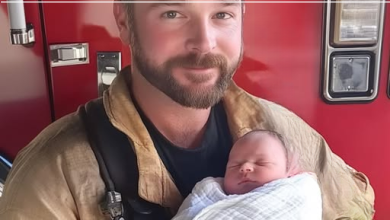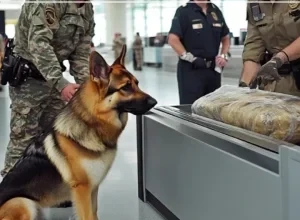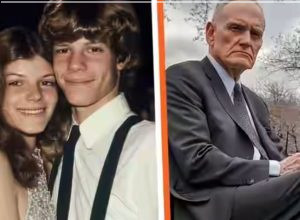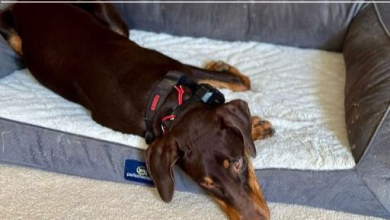I Moved to Get Away from Everyone—But These Three Animals Had Other Plans
I came here to disappear.
No WiFi. No neighbors. No city noise. Just wind, dust, and the endless Mediterranean—quiet, vast, and untouched. That was the plan. Off-grid. Unreachable. Alone.
Then came the uninvited guests.
First was the donkey—rough around the edges, stubborn, and clearly used to getting his way. One morning he simply wandered onto my land, parked himself next to the shed, and decided he wasn’t leaving. I gave him water. That was all it took.
Next showed up the dog—spotted, goofy, with a tongue that never seemed to go away and a tail that wagged like he’d finally been told he was good enough. He followed the donkey in like they were on a joint mission. Slept outside my door like he’d always lived here. I tried to pretend he wasn’t mine. He didn’t care.
Then came the cat. Small. Wary. Wild. She launched herself at me like she’d been watching from a distance, waiting for the right moment to decide I was worth the risk.
I gave them names.
The cat: Minx.
The dog: Zito.
The donkey? Tiberius. Because, well… just look at him.
I didn’t take them in. I didn’t ask for them. But they claimed me—like I’d been theirs all along.
And today?
Today changed everything.
We’d hiked up to the ridge—Minx curled in my shirt, Zito perched on Tiberius like the world’s most ridiculous traveling act—when I spotted something I’d never seen before.
A stone marker. Weathered. Nearly swallowed by the earth. The initials carved into it stopped me cold.
They were familiar—ones I hadn’t thought about in years.
And tucked beneath a pair of stones?
An envelope.
At first I thought it was old trash. Or a trick of the light. But as I brushed off the dirt, the handwriting hit me like a punch. It was hers. My grandmother’s.
She passed five years ago. Left behind stories I never took seriously—talk of “sacred places” and “guides that choose you.” I figured it was just another one of her wild tales.
Until now.
Tiberius nudged me gently. Zito barked once. Minx curled up on the stone beside me like she’d been waiting for this moment.
I opened the envelope.
The paper inside was yellowed but intact. Written in her unmistakable looping cursive—the same handwriting that filled every postcard she sent me as a kid.
Dear Arlo,
I hoped you’d find this someday. Not everyone does.
This land holds secrets older than memory. Secrets I promised not to share until someone proved worthy. You’ve done that—without even knowing.
If you’re reading this, it means the animals have chosen you. They know things we don’t. Trust them. They’ll lead you where you’re meant to be.
I reread it, heart pounding. Chosen? How could she have known about the three animals that had randomly wandered into my life?
Minx pawed at my hand. Zito stared toward the horizon, ears perked. Tiberius brayed and turned down the trail like it was time to go.
It was ridiculous to follow them based on a cryptic letter. But something in me—a quiet, aching part that missed her—said I had to.
So I slid the letter into my pocket, climbed onto Tiberius (he didn’t even flinch), and let them lead.
We wandered for hours through winding paths and over rocky ground. As the sun dipped low and painted the sky with fire, we reached a clearing I’d never seen before.
At its center stood an ancient olive tree—twisted and strong, brimming with fruit.
Beneath it was another marker, smaller than the first. Carved into its surface was a symbol: a spiral inside a circle.
Zito sniffed the base of the tree, tail wagging furiously. Minx disappeared into the brush and returned seconds later, a small key clenched in her jaws.
Tiberius knelt, as if inviting me down.
“What are you all doing?” I asked aloud, even though I already knew.
The key was old. Rusted. Elegant. And I knew what it opened.
Weeks ago, I’d found a wooden chest tucked away in the attic of my cottage. Too heavy to move. Too strange to open. Now I had the missing piece.
Back home, the three animals gathered around as I pulled the chest from its corner. The symbols on its lid matched the one carved on the stone.
I slid the key in. Turned it.
Inside was a time capsule of wonder:
A photograph of my grandmother standing under the same olive tree.
A worn leather journal filled with pages of her notes.
And a small glass vial of golden liquid that shimmered in the candlelight.
The journal called it Lumina—a rare elixir meant to awaken clarity, purpose, and memory. But only if used with a pure heart. She warned: it wasn’t a shortcut. It was a responsibility.
I didn’t drink it right away.
For days, I read her words, explored the land, and listened—really listened. Every corner of this place held whispers of something deeper. With each step, the isolation I once craved felt less like hiding and more like healing.
Then, one night under the olive tree, with Minx curled up beside me, Zito snoring softly at my feet, and Tiberius grazing nearby, I made my decision.
I took a sip of Lumina.
Warmth rushed through me. Peace. Like something locked away deep inside had finally been released. I saw flashes—memories not just mine, but of those who came before me. Pilgrims. Healers. Wanderers. All drawn here by the same invisible force.
I understood then. My grandmother hadn’t just left me a legacy—she’d left me a calling.
In the months that followed, people started arriving. Travelers. Strangers. Souls looking for something they couldn’t quite name. Somehow, word got out—whether through whispers, winds, or perhaps the animals themselves.
And I welcomed them.
With kindness. With stories. With the same open heart I had once tried to guard so tightly.
Tiberius, Zito, and Minx never left my side. They weren’t pets. They were protectors. Messengers. Family.
And through them, I learned this:
You can try to escape people.
You can build walls, seek silence, chase solitude.
But sometimes, what you really need isn’t to be away from the world—
It’s to be found by it.
So if you’ve ever felt like hiding, like running, like giving up on connection… don’t.
Wait. Watch. Listen.
The universe might send you something—or someone—you didn’t know you needed.
Even if it shows up on four legs, hooves, or a twitching tail.
If this story spoke to you, share it with someone who needs a little hope. Because sometimes, the wildest hearts bring us home. 🐾🕊️🌿




